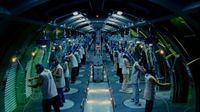MOVIE REVIEW
Sleep Dealer (2008)
Intellectually and technologically ambitious, "Sleep Dealer" falls short due to execution. With the theme of electronic connectivity coupled with artificial intelligence, the film draws inevitable comparisons to "The Matrix." But "Sleep Dealer" is easier to recognize and relate to, perhaps because entities like Facebook and Twitter have annexed our virtual lives. This film adds commerce to the equation, allowing the consumption of memories as well as military strikes portrayed on reality television. It’s too bad the film falls short.
Directed by Alex Rivera, "Sleep Dealer" tells a story set in the near future, where the border between Mexico and America is very controlled. Also regulated is the control of the world’s water supply, and this is where the film commences. Memo (Luis Fernando Peña) and his father travel to the heavily-armed water supply and must purchase water for their home. Memo is a man obsessed with technology and has assembled a radio interceptor that allows him to hear seemingly private conversations.
One of conversations is not meant for Memo or anyone else for that matter. The aforementioned military traced Memo’s interception and in response dispatched a remotely controlled fighter jet to bomb the Memo’s shanty. Fortunately, Memo was not at home during the attack, and he sets out to avenge his family’s death. He leaves the Santa Ana village for the bustling border town, Tijuana.
It is here that "Sleep Dealer" loses steam. Up to this point, the film has set up its world nicely. We see reality TV hosts commenting on the remotely-controlled jets and evidence that water is now the most coveted natural resource. Memo’s reaction is certainly understandable, but he travels to Tijuana without any plan and no idea of how to obtain his revenge.
In Tijuana he meets the beautiful Luz (Leonor Varela), a journalist of sorts. She connects to her computer through several bodily implants called nodes (think of the jack on Neo’s neck in "The Matrix"), and her memories upload to the computer are available for purchase. Memo needs money quick and asks Luz to implant him with nodes so that he may work in one of the node factories.
The node factories present the most provocative and compelling moments in "Sleep Dealer." Humans plug into the system and wear special contact lenses allowing them to virtually control a construction device (a pseudo "Wall-E" machine) building a skyscraper in San Diego, thus wrapping issues immigrant workers and artificial intelligence into a neat scenario. The only problem with this work is that it is physically and mentally draining leading civilians to dub these node factories as “sleep dealers.”
"Sleep Dealer" has its humorous moments. Memo communicates with his family through a public video-chat machine and at the end he must continually input currency into the machine, but the machine of course automatically includes the various taxes. The same is true when he sends money back home. It looks a lot like a current cell phone bill: transaction and processing fees suddenly coming out of nowhere.
Eventually, Memo comes into contact with the man responsible for the attack on his home. Rudy (Jacob Vargas) feels guilt over having killed his family and wishes to make amends. Even though we are led to believe that Rudy found Memo via the memories provided by Luz, their meeting feels too dependent on chance, much like the rest of the film. Memo travels to Tijuana without a plan of action. He just knows that he needs to go there. Meeting Luz and Rudy feels too random of an occurrence. And the technological questions raised are not fully explored. "Sleep Dealer" does not take a stance for or against the technology and artificial intelligence. Is "Sleep Dealer" a warning or simply a premonition?
SLEEP DEALER
Opened on April 17 in Manhattan.
Directed and edited by Alex Rivera; written by Mr. Rivera and David Riker; director of photography, Lisa Rinzler; music by Tomandandy; production designer, Miguel Ángel Álvarez; produced by Anthony Bregman; released by Maya Entertainment. In Spanish and English, with English subtitles. Running time: 1 hour 30 minutes. This film is rated PG-13.
WITH: Luis Fernando Peña (Memo Cruz), Leonor Varela (Luz Martinez) and Jacob Vargas (Rudy Ramírez).

Comments